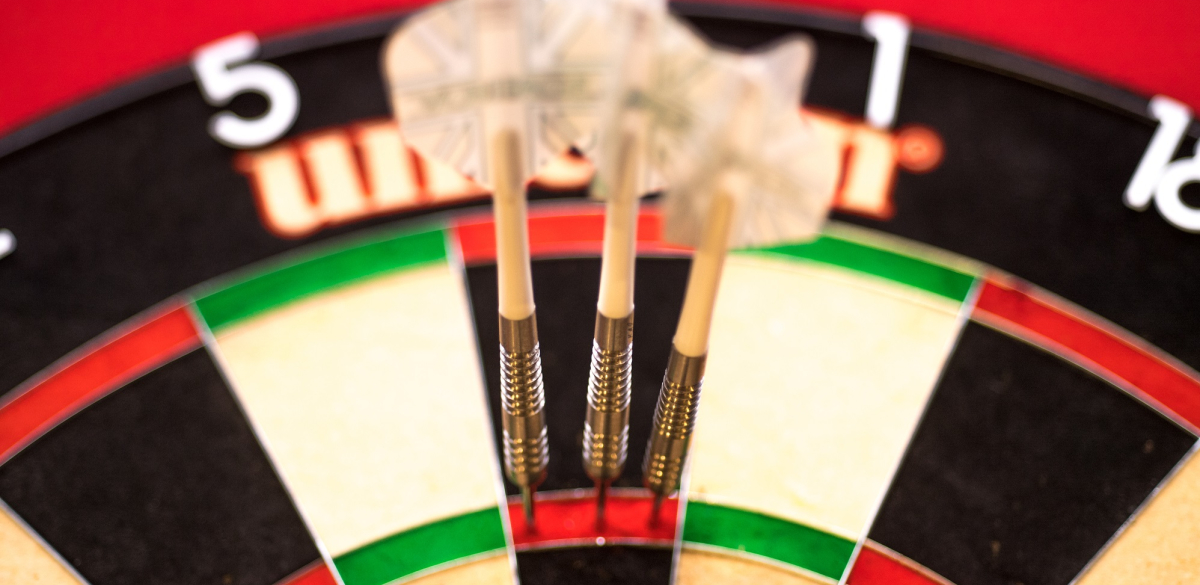
The most exhaustive professional research ever undertaken of Rejected Darts has revealed that 99.65% of darts thrown count towards scoring during PDC events.
Christopher Kempf, the statistical analyst of the PDC, recorded data from televised tournaments and European Tour events held in 2018 and the first half of 2019 to analyse the frequency of rejected darts – most commonly referred to as "bounce-outs” – both by player and event.
Almost 603,000 darts were recorded during the 19-month analysis, which began at the 2017/2018 World Championship and ended following the 2019 US Darts Masters in early July.
The evolution of Unicorn dartboards throughout their partnership with the PDC has led to the current HD2 dartboard used in tournaments, providing a clearer playing surface than ever before, while the “round-wire” boards, most common in the 1990s, have now been replaced by a thinner, embedded “spider”.
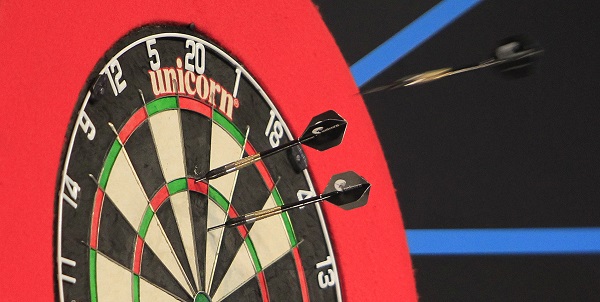
However, with the potential for previous darts to act as a block to incoming darts, as well as variations in throwing style alongside board-to-board variations, the total elimination of rejected darts would be impossible – with many “bounce-outs” actually being darts which never fully reach the dartboard after clashing in-flight with a previously thrown dart.
Of all 602,897 darts recorded, just 100 were rejected as the first dart thrown (0.017%), with that figure rising to 696 (0.115%) for the second dart and 1284 (0.213%) for the third dart – leading to an overall average of one dart rejected for every 290 thrown.
Lowest Rejection Rate - Events
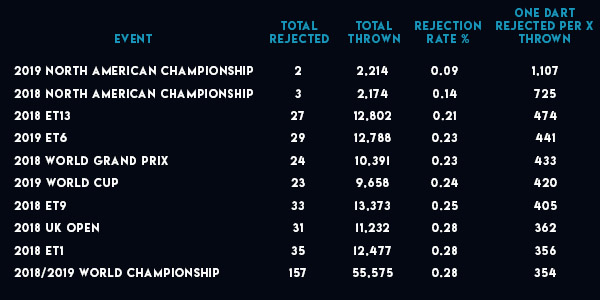
The lowest ratio of rejected darts across the 48 tournaments was found to be the 2019 North American Championship (two from 2,214 darts thrown), ahead of the 2018 North American Championship (three from 2,174 darts thrown) and the 2018 European Darts Trophy (27 from 12,802 darts thrown).
Highest Rejection Rate - Events
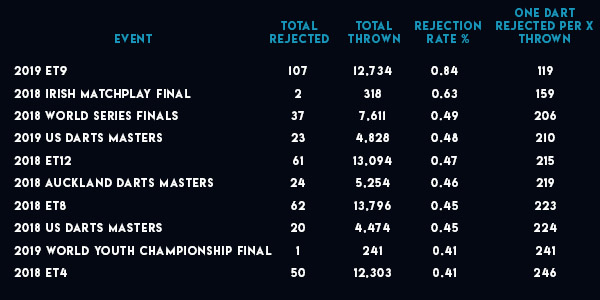
The 2018/2019 World Championship was the tournament with the most darts thrown, 55,575, and saw a rejection rate of one dart for every 354 thrown (0.28%), compared to one dart rejected per 289 thrown at the 2017/2018 World Championship (0.35%) – meaning a year-on-year decrease despite the expansion of the event to 96 players.
The highest incidence came in the 2019 Czech Darts Open, with the total of 107 from 12,734 darts thrown (0.84%) being significantly ahead of the 2018 Tom Kirby Memorial Irish Matchplay final’s two from 318 darts thrown in a nine-leg match (0.63%) and the 37 from 7,611 darts thrown (0.49%) at the 2018 World Series of Darts Finals.
When comparing player data, players who throw with a flatter angle of entry into the dartboard are found to experience fewer rejected darts than those whose darts arrive at a steeper descent.
Current PDC Top Ten
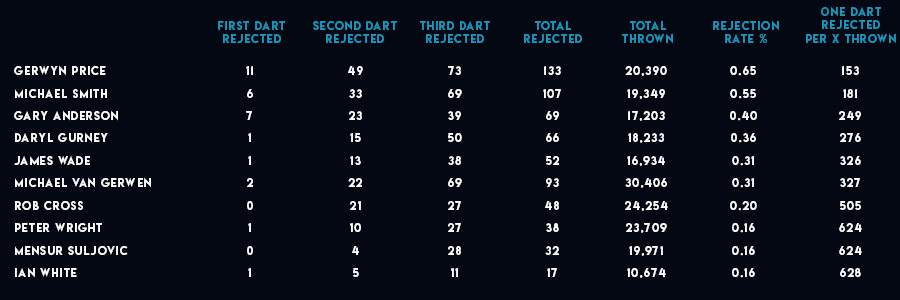
World number one Michael van Gerwen threw the most darts during the period of analysis, 30,406, and had a rejection rate of one every 327 darts thrown (0.31%) – lower than the overall average.
2018 World Champion Rob Cross had a rejection rate of one dart for every 505 thrown during that time (48 from 24,254 darts thrown), while Peter Wright lost 38 from 23,709 darts thrown - a rejection rate of one every 624 darts thrown which was matched by Mensur Suljovic (32 rejected darts from 19,971 darts thrown).
The highest incidence of rejected darts amongst the top 16 came from 2018 Grand Slam of Darts winner Gerwyn Price, who lost one dart per 153 darts thrown (133 from 20,390 darts thrown during the period).
World Championship and Premier League finalist Michael Smith's one rejected dart per 181 thrown (107 from 19,349) was the next highest of the current top ten, ahead World Matchplay and Champions League winner Gary Anderson’s one per 249 darts thrown (69 from 17,203).
Price also suffered the most rejected darts with his first dart thrown (11), head of Anderson’s seven, Smith’s six and Danny Noppert’s five, from a total of 40 rejected darts suffered by the Dutchman from over 4,000 recorded since he joined the PDC in 2018.
Highest Rejection Rate - Players
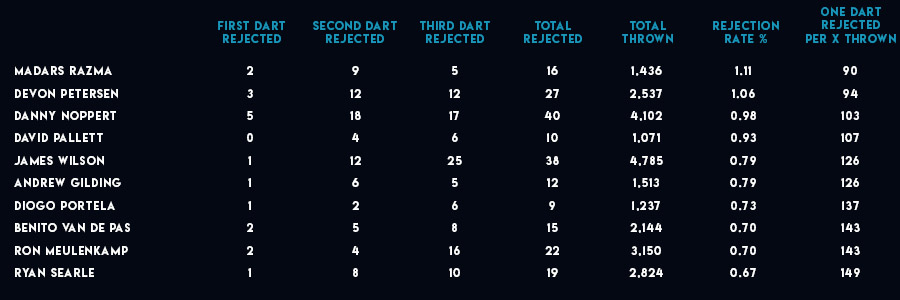
Of the players recorded who threw more than 1,000 darts, only two suffered a rejected dart ratio of one in under 100 darts thrown - Madars Razma’s one in 90 and Devon Petersen’s one in 94.
Lowest Rejection Rate - Players
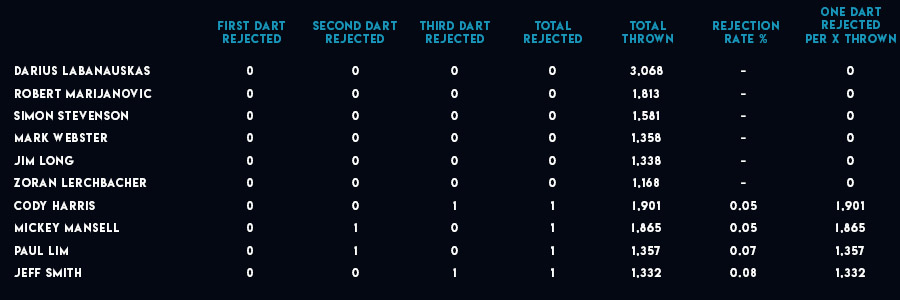
Six players suffered no rejected darts at all, including three – Darius Labanauskas, Robert Marijanovic and Simon Stevenson – who threw more darts than Razma during the same period, while a further seven players suffered only one rejected dart from between 1143-1901 darts recorded.
The data was also analysed by Unicorn’s flight dynamics expert, the “Uniboffin”, who summarised that the ratio of rejected darts is “lower than even I expected, less than one per match for the majority of players…with a slight upward trend detectable.
“My hypothesis is that this trend is partly down to ever-improving accuracy and hence dart-on-dart and treble 20 or bull wire impacts. Some players consistently get far more than others, sometimes by a factor of 4 or even 5.
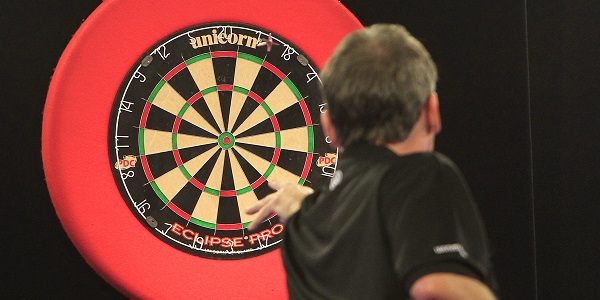
“The dynamicist in me suspects this may be to do with the angle a player’s darts land in the board and simply how long they are. A dart that lands sharply point-down can more easily rebound off even the modern low-profile “blade” wires at the top and bottom of, say, treble 20.
“Moreover, longer darts are simply more likely to get in each other’s way. It’s significant that Christopher Kempf's analysis also revealed that a player’s second dart is around 7 times as likely to be [a rejected dart] as their first, with the third nearly twice as likely again.”
The full data analysis from Christopher Kempf can be seen at this link.
For further analysis of the data, Unicorn's "Uniboffin" has written blogs which can be read at this link and this link.
Full Event Table
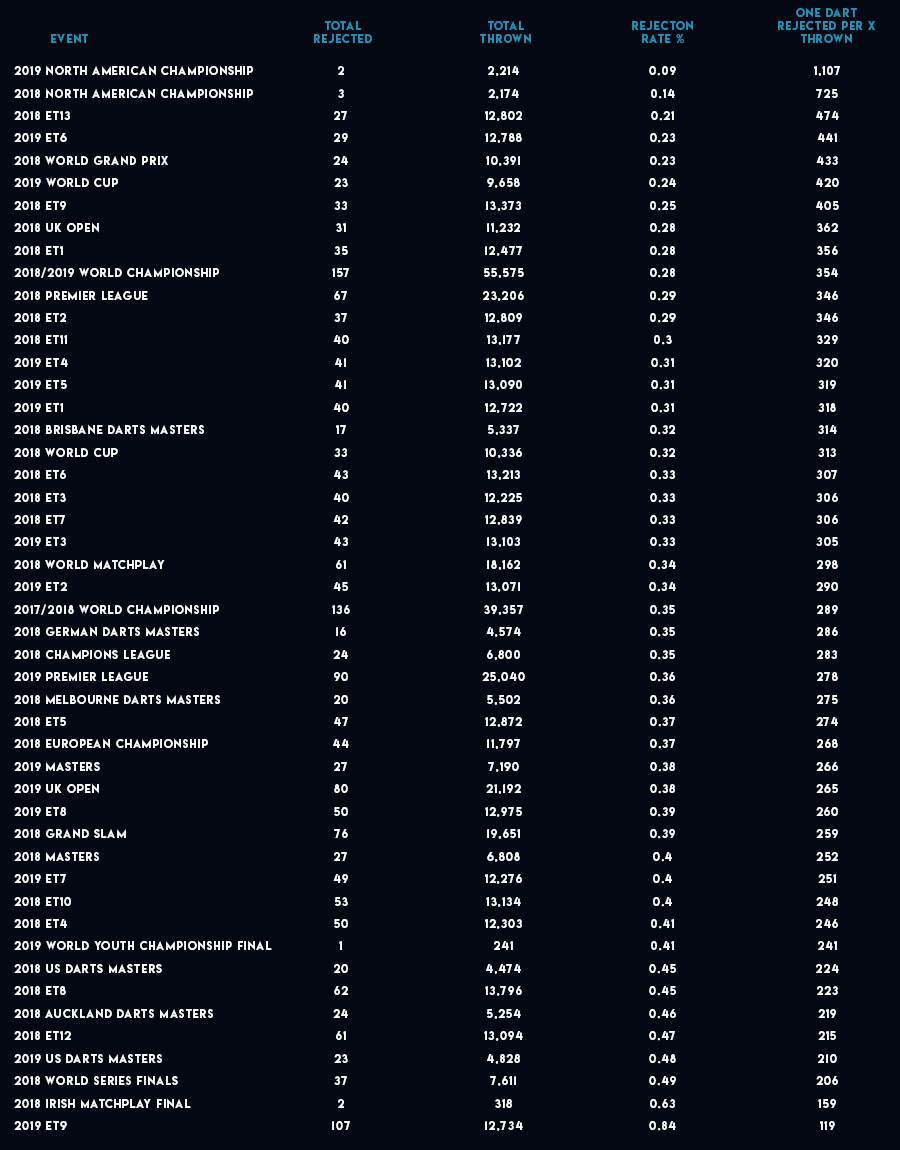
Follow Christopher Kempf on Twitter through @Ochepedia
Data provided by Christopher Kempf.